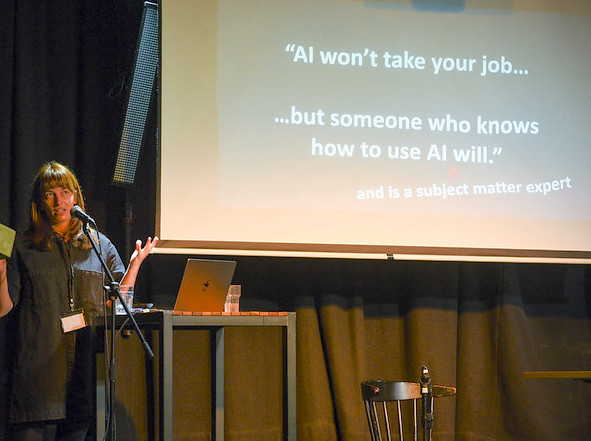Artificial intelligence? Not my problem! Too busy running my publishing or media business.
If that’s you, stop and think again. This AI stuff is moving much faster than we thought. Here’s four good reasons why publishers shouldn’t ignore AI.
Thanks to the MX3 AI summit in London last week I am better informed, a little more scared, but feel there are more opportunities for media and publishing.
1. It’s later than you think – Singularity in 2031?
Generative AI and large language models (LLMs) are developing much faster than expected. The “singularity” – the point where artificial intelligence surpasses the level of human intelligence (and develops beyond its control) was considered decades in the future. But in Nov 2023, Ben Goertzel, CEO of Singularity.net, forecast that AGI (artificial general intelligence) is only a few years away.
At the MX3 AI event, Ross Sleight, Chief Strategy Officer of CI&T, pointed out that no-one knows how LLMs actually work. And, as all models are currently owned by corporates, they will encourage racing ahead with tech development, while government regulation lags some way behind.
Gen AI will drive change, creating winners and losers. Already Deep Mind is developing thousands of new chemical structures, which could accelerate healthcare solutions. Chat will quickly replace traditional search, and directory-style businesses like Expedia may cease to exist. News and specialist media will lose traffic if online users get immediate answers and don’t need to visit the information source. Misinformation will proliferate, and deep fakes will undermine consumer trust in media brands.
So media leaders need to grasp this challenge now, to understand the potential and risks of AI, and plan how to incorporate into their strategy.
2. Human plus AI is better than either human or AI solo
During the day, speakers described AI as “like a raw intern”, good for a first draft or basic analysis, but requiring checking and editing before publication. Media like Sports Illustrated have learned the hard way that unfiltered AI content can destroy trust.
Consensus is that the most effective combination is human plus AI, rather than either human or AI solo. This may be consoling for journalists and marketers concerned about their jobs. AI can replace repetitive tasks, freeing up journalists for more original, investigative or human interest stories. And humans remain best at building audience engagement through emotive and expert content.
Matt D’Cruz of head-hunter Tripp Associates pointed out that humans still beat AI in emotional intelligence, intuition, influencing and teamwork. Humans also excel at building trust and relationships, so the ideal organisation combines these skills with smart use of AI technology. Demand for AI specialists exceeds demand, so most firms will have to develop the skills in-house by educating and equipping their own teams.
3. Publishers are already using AI – examples
Charlie Beckett of POLIS at LSE surveyed over 100 news organisations worldwide and found over 75% are already using AI for fact-checking, summaries, translation, reformatting or personalisation. AI can also help journalists find stories in data.
Even small indie publishers can experiment. For example the Cumbrian and Westmorland Herald now uses AI to write up reports on local sheep auctions, freeing up journalists for other reporting.
Julian Thorne of Sub (x) discussed how AI can improve subscription marketing by replacing traditional A/B testing with a broader range of options, offering the optimal offer and user journey to different cohorts of customers.
Labrador CMS makes it easy for entire editorial teams to access GPT-4 to create headlines, meta descriptions, fact boxes, summaries, captions and translations for online articles.
Miso.ai offers a search solution, answers, that enables publishers to set up chat-based search on their own content, with a citation for every source used.
4. You can win round your teams – here’s how
Staff at media businesses may be concerned or apprehensive about AI. Immediate Media found their staff split 50/50 between positive and negative views. They set up a company-wide workshop day with talks and demos, then invited project submissions. Seventy were received and 27 selected to investigate at a second experimentation day. Projects spanned content production, internal processes and user facing services. Afterwards, staff were 80% positive/ 20% negative.
William Reed took a different approach – creating an online team, called the “Waddle Inn” for interested staff to share project ideas and ask questions. Members included marketing, tech, sales and editorial. As well as an online forum, they held in person drop in sessions in the company canteen. The group produced an AI newsletter and is now using AI to document code, connect the style book to the CMS, and summarise information from complex sources such as financial statements. They also drafted an AI policy now published on the WRBM site.
FT strategies facilitated a “Design Sprint” hosted by Google for a number of local news media. Like Immediate media they began with informational workshops. Then they asked teams to define user or business problems, and consider how to use AI to solve them. Key steps are to define the inputs and data, map the processes, and determine the outputs.
Further reading on AI
https://speciall.media/2023/10/26/practical-ai-tools-for-independent-publishers/
https://speciall.media/2023/03/30/applications-of-generative-ai-for-publishers/
What should publishers do next?
A good starting point is to gather a group of enthusiasts/ emerging experts from within the organisation, and compile examples of AI tools already available. Try adapting the whole company workshops idea to help engage teams and reduce concerns – and generate project ideas.
To share your successes (and cautionary tales) with your peers, request to join the Speciall Media Group, a community of over 250 publishers run by Carolyn Morgan on Guild. It’s free (for now) but invite only.
If you want to chat about your digital strategy for your media business over a real or virtual coffee, please get in touch.
About the author
Carolyn Morgan has acquired, launched, built, and sold specialist media businesses in print, digital and events. She now advises niche consumer and B2B publishers on developing new products and digital revenue streams as a consultant and NED.

